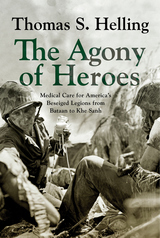32931 books about History and 1606
32931 books about History
1606 start with F start with F
1606 start with F start with F
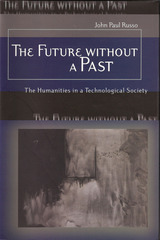
The Future without a Past
The Humanities in a Technological Society
John Paul Russo
University of Missouri Press, 2005
In The Future without a Past, John Paul Russo goes beyond currently given reasons for the decline of the humanities and searches out its root causes in the technologization of everyday life. His main premise is that we are undergoing a transformation at the hands of technological imperatives such as rationalization, universalism, monism, and autonomy. The relation between ourselves and nature has altered to such a degree that we no longer live in a natural environment but in a technological one. According to Russo, technological values have actually eroded human values instead of being “humanized” by them.
What are the implications of this shift for the humanities, traditionally seen as safeguards of the human? Russo addresses this question by situating the decline of the humanities within the larger social and historical panorama. He explores how technological values have infiltrated the humanities to the point of weakening their instruction and undermining their force; at the same time, he shows how the humanities have confronted these trends and can continue to do so. Russo believes that if we understand how technology “works” and the nature of its powers, we will then know in which realms it must be accepted and where it should be resisted.
Russo outlines the components of the technological system and examines their impact on the educational system. He also discusses the loss of historical memory, including the so-called loss of the self and the transformation of the library. He studies the parallels between technological and literary values in criticism and theory, concluding with an analysis of the fiction of Don DeLillo, one of the most prominent contemporary novelists. DeLillo’s exploration of technology in American life, matched by a powerful critique of it from a broadly humanistic and religious perspective, serves to summarize the themes of the book as a whole.
The Future without a Past will appeal to scholars and students of literary studies, intellectual and cultural history, philosophy, ethics, media studies, and American studies, as well as to general readers who are seeking deeper insights into today’s cultural debates.
[more]

FUTURE/PRESENT
Arts in a Changing America
Daniela Alvarez, Roberta Uno, and Elizabeth M. Webb, editors
Duke University Press, 2024
FUTURE/PRESENT brings together a vast collection of writers, artists, activists, and academics working at the forefront of today’s most pressing struggles for cultural equity and racial justice in a demographically changing America. The volume builds upon five years of national organizing by Arts in a Changing America, an artist-led initiative that challenges structural racism by centering people of color who are leading innovation at the nexus of arts production, community benefit, and social change. FUTURE/PRESENT includes a range of essays and criticism, visual and performance art, artist manifestos, interviews, poetry, and reflections on community practice. Throughout, contributors examine issues of placekeeping and belonging, migration and diasporas, the carceral state, renegotiating relationships with land, ancestral knowledge as radical futurity, and shifting paradigms of inequity. Foregrounding the powerful resilience of communities of color, FUTURE/PRESENT advances the role of artists as first responders to injustices, creative stewards in the cohesion and health of communities, and innovative strategists for equity.
Selected contributors. Dahlak Brathwaite, adrienne maree brown, Jeff Chang, Tameca Cole, Ofelia Esparza, Antoine Hunter, Nobuko Miyamoto, Wendy Red Star, Spel, Jose Antonio Vargas, Carrie Mae Weems, Hinaleimoana Kwai Kong Wong-Kalu
Selected contributors. Dahlak Brathwaite, adrienne maree brown, Jeff Chang, Tameca Cole, Ofelia Esparza, Antoine Hunter, Nobuko Miyamoto, Wendy Red Star, Spel, Jose Antonio Vargas, Carrie Mae Weems, Hinaleimoana Kwai Kong Wong-Kalu
[more]
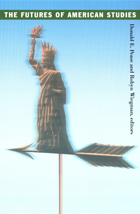
The Futures of American Studies
Donald E. Pease and Robyn Wiegman, eds.
Duke University Press, 2002
Originating as a proponent of U.S. exceptionalism during the Cold War, American Studies has now reinvented itself, vigorously critiquing various kinds of critical hegemony and launching innovative interdisciplinary endeavors. The Futures of American Studies considers the field today and provides important deliberations on what it might yet become. Essays by both prominent and emerging scholars provide theoretically engaging analyses of the postnational impulse of current scholarship, the field's historical relationship to social movements, the status of theory, the state of higher education in the United States, and the impact of ethnic and gender studies on area studies. They also investigate the influence of poststructuralism, postcolonial studies, sexuality studies, and cultural studies on U.S. nationalist—and antinationalist—discourses. No single overriding paradigm dominates the anthology. Instead, the articles enter into a lively and challenging dialogue with one another. A major assessment of the state of the field, The Futures of American Studies is necessary reading for American Studies scholars.
Contributors. Lindon Barrett, Nancy Bentley, Gillian Brown, Russ Castronovo, Eric Cheyfitz, Michael Denning, Winfried Fluck, Carl Gutierrez-Jones, Dana Heller, Amy Kaplan, Paul Lauter, Günter H. Lenz, George Lipsitz, Lisa Lowe, Walter Benn Michaels, José Estaban Muñoz, Dana D. Nelson, Ricardo L. Ortiz, Janice Radway, John Carlos Rowe, William V. Spanos
[more]
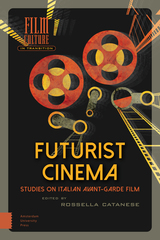
Futurist Cinema
Studies on Italian Avant-garde Film
Edited by Rossella Catanese
Amsterdam University Press, 2017
Futurism and early cinema shared a fascination with dynamic movement and speed, presenting both as harbingers of an emerging new way of life and new aesthetic criteria. And the Futurists quickly latched on to cinema as a device with great potential to manipulate our perceptions in order to create a new world. In the edited collection Futurist Cinema, Rossella Catanese explores that conjunction, bringing in avant-garde artists and their manifestos to show how painters and other artists turned to cinema as a model for overcoming the inherently static nature of painting in order to rethink it for a new era.
[more]
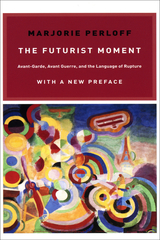
The Futurist Moment
Avant-Garde, Avant Guerre, and the Language of Rupture, with a New Preface
Marjorie Perloff
University of Chicago Press, 2004
Marjorie Perloff's stunning book was one of the first to offer a serious and far-reaching examination of the momentous flourishing of Futurist aesthetics in the European art and literature of the early twentieth century. Offering penetrating considerations of the prose, visual art, poetry, and carefully crafted manifestos of Futurists from Russia to Italy, Perloff reveals the Moment's impulses and operations, tracing its echoes through the years to the work of "postmodern" figures like Roland Barthes. This updated edition, with its new preface, reexamines the Futurist Moment in the light of a new century, in which Futurist aesthetics seem to have steadily more to say to the present.
[more]
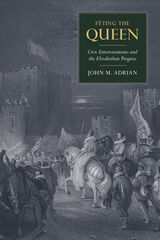
Fêting the Queen
Civic Entertainments and the Elizabethan Progress
John M Adrian
University of Massachusetts Press, 2021
In a 1572 visit to Warwick, Queen Elizabeth looked out the window of her lodgings and saw local people dancing in the courtyard, a seemingly spontaneous performance meant to entertain her. During her travels, she was treated to fireworks, theatrical performances, and lavish banquets. Reconstructing the formal and informal events that took place throughout Elizabeth's progress visits, events rich in pageantry and ceremony, John M. Adrian demonstrates how communities communicated their character, as well as their financial and political needs, to noble guests.
While previous scholars have studied Elizabeth I and her visits to the homes of influential courtiers, Fêting the Queen places a new emphasis on the civic communities that hosted the monarch and their efforts to secure much needed support. Case studies of the cities of Oxford, Canterbury, Sandwich, Bristol, Worcester, and Norwich focus on the concepts of hospitality and space—including the intimate details of the built environment.
While previous scholars have studied Elizabeth I and her visits to the homes of influential courtiers, Fêting the Queen places a new emphasis on the civic communities that hosted the monarch and their efforts to secure much needed support. Case studies of the cities of Oxford, Canterbury, Sandwich, Bristol, Worcester, and Norwich focus on the concepts of hospitality and space—including the intimate details of the built environment.
[more]
READERS
Browse our collection.
PUBLISHERS
See BiblioVault's publisher services.
STUDENT SERVICES
Files for college accessibility offices.
UChicago Accessibility Resources
home | accessibility | search | about | contact us
BiblioVault ® 2001 - 2024
The University of Chicago Press






